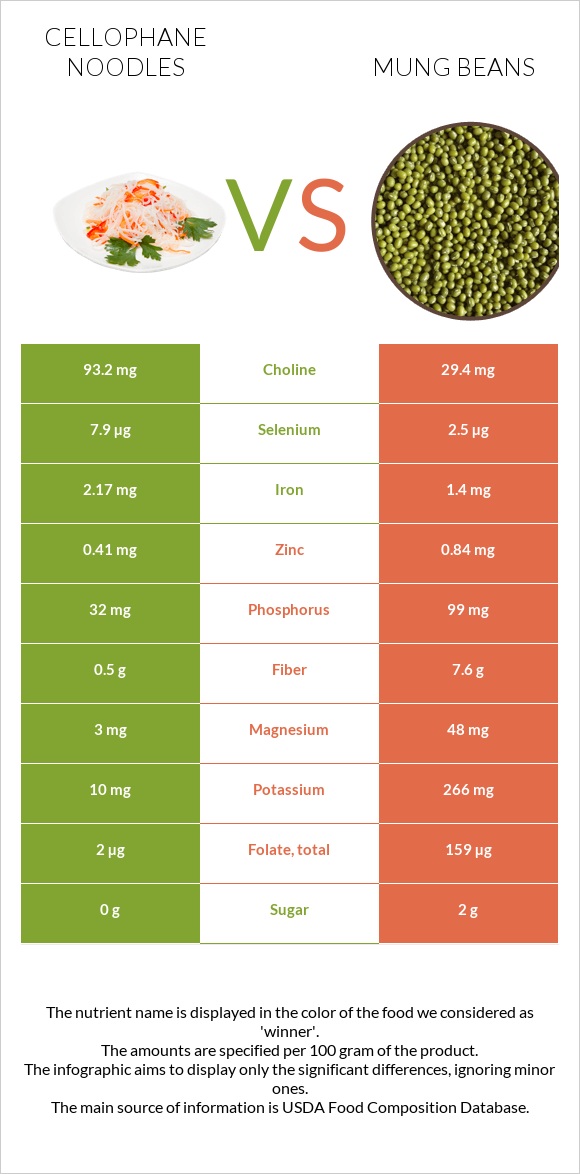Cellophane noodles vs. Mung beans — In-Depth Nutrition Comparison
Compare
Summary of differences between cellophane noodles and mung beans
- Cellophane noodles have more choline, selenium, and iron, while mung beans have more folate, fiber, magnesium, phosphorus, manganese, copper, and potassium.
- Mung beans cover your daily need for folate, 39% more than cellophane noodles.
- Cellophane noodles contain 3 times more choline than mung beans. While cellophane noodles contain 93.2mg of choline, mung beans contain only 29.4mg.
These are the specific foods used in this comparison Noodles, chinese, cellophane or long rice (mung beans), dehydrated and Mung beans, mature seeds, cooked, boiled, without salt.
Infographic

Infographic link
Mineral Comparison
Mineral comparison score is based on the number of minerals by which one or the other food is richer. The "coverage" charts below show how much of the daily needs can be covered by 300 grams of the food.
| Contains more IronIron | +55% |
| Contains more SeleniumSelenium | +216% |
| Contains more MagnesiumMagnesium | +1500% |
| Contains more PotassiumPotassium | +2560% |
| Contains more CopperCopper | +92.6% |
| Contains more ZincZinc | +104.9% |
| Contains more PhosphorusPhosphorus | +209.4% |
| Contains less SodiumSodium | -80% |
| Contains more ManganeseManganese | +198% |
Vitamin Comparison
Vitamin comparison score is based on the number of vitamins by which one or the other food is richer. The "coverage" charts below show how much of the daily needs can be covered by 300 grams of the food.
| Contains more Vitamin CVitamin C | +∞% |
| Contains more Vitamin AVitamin A | +∞% |
| Contains more Vitamin EVitamin E | +15.4% |
| Contains more Vitamin B2Vitamin B2 | +∞% |
| Contains more Vitamin B3Vitamin B3 | +188.5% |
| Contains more Vitamin B5Vitamin B5 | +310% |
| Contains more Vitamin B6Vitamin B6 | +34% |
| Contains more Vitamin KVitamin K | +∞% |
| Contains more FolateFolate | +7850% |
All nutrients comparison - raw data values
| Nutrient |  |
 |
DV% diff. |
| Folate | 2µg | 159µg | 39% |
| Fiber | 0.5g | 7.6g | 28% |
| Carbs | 86.09g | 19.15g | 22% |
| Protein | 0.16g | 7.02g | 14% |
| Calories | 351kcal | 105kcal | 12% |
| Choline | 93.2mg | 29.4mg | 12% |
| Magnesium | 3mg | 48mg | 11% |
| Iron | 2.17mg | 1.4mg | 10% |
| Phosphorus | 32mg | 99mg | 10% |
| Selenium | 7.9µg | 2.5µg | 10% |
| Manganese | 0.1mg | 0.298mg | 9% |
| Potassium | 10mg | 266mg | 8% |
| Copper | 0.081mg | 0.156mg | 8% |
| Vitamin B5 | 0.1mg | 0.41mg | 6% |
| Vitamin B2 | 0mg | 0.061mg | 5% |
| Zinc | 0.41mg | 0.84mg | 4% |
| Vitamin B3 | 0.2mg | 0.577mg | 2% |
| Vitamin K | 0µg | 2.7µg | 2% |
| Vitamin C | 0mg | 1mg | 1% |
| Vitamin B1 | 0.15mg | 0.164mg | 1% |
| Vitamin B6 | 0.05mg | 0.067mg | 1% |
| Polyunsaturated fat | 0.018g | 0.128g | 1% |
| Fats | 0.06g | 0.38g | 0% |
| Net carbs | 85.59g | 11.55g | N/A |
| Calcium | 25mg | 27mg | 0% |
| Sugar | 0g | 2g | N/A |
| Sodium | 10mg | 2mg | 0% |
| Vitamin A | 0µg | 1µg | 0% |
| Vitamin E | 0.13mg | 0.15mg | 0% |
| Saturated fat | 0.017g | 0.116g | 0% |
| Monounsaturated fat | 0.008g | 0.054g | 0% |
| Tryptophan | 0.002mg | 0.076mg | 0% |
| Threonine | 0.005mg | 0.23mg | 0% |
| Isoleucine | 0.007mg | 0.297mg | 0% |
| Leucine | 0.013mg | 0.544mg | 0% |
| Lysine | 0.011mg | 0.49mg | 0% |
| Methionine | 0.002mg | 0.084mg | 0% |
| Phenylalanine | 0.01mg | 0.425mg | 0% |
| Valine | 0.008mg | 0.364mg | 0% |
| Histidine | 0.005mg | 0.205mg | 0% |
Macronutrient Comparison
Macronutrient breakdown side-by-side comparison
Protein:
0.16 g
Fats:
0.06 g
Carbs:
86.09 g
Water:
13.42 g
Other:
0.27 g
Protein:
7.02 g
Fats:
0.38 g
Carbs:
19.15 g
Water:
72.66 g
Other:
0.79 g
| Contains more CarbsCarbs | +349.6% |
| Contains more ProteinProtein | +4287.5% |
| Contains more FatsFats | +533.3% |
| Contains more WaterWater | +441.4% |
| Contains more OtherOther | +192.6% |
Fat Type Comparison
Fat type breakdown side-by-side comparison
Saturated fat:
Sat. Fat
0.017 g
Monounsaturated fat:
Mono. Fat
0.008 g
Polyunsaturated fat:
Poly. Fat
0.018 g
Saturated fat:
Sat. Fat
0.116 g
Monounsaturated fat:
Mono. Fat
0.054 g
Polyunsaturated fat:
Poly. Fat
0.128 g
| Contains less Sat. FatSaturated fat | -85.3% |
| Contains more Mono. FatMonounsaturated fat | +575% |
| Contains more Poly. FatPolyunsaturated fat | +611.1% |





